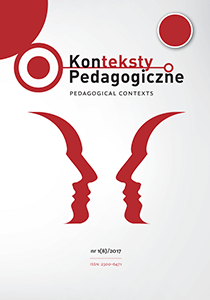Abstract
non
References
Bonna, B. (2006). Rodzina i przedszkole w kształtowaniu umiejętności muzycznych dzieci: zastosowanie koncepcji Edwina E. Gordona. Bydgoszcz: UKW.
Bonna, B. (2016). Zdolności i kompetencje muzyczne uczniów w młodszym wieku szkolnym. Bydgoszcz: Wydawnictwo Uniwersytetu Kazimierza Wielkiego.
Burowska, Z. (1980). Słuchanie i tworzenie muzyki w szkole. Warszawa: WSiP.
Gordon, E.E. (1997). Umuzykalnienie niemowląt i małych dzieci. Kraków: ZamKor.
Gordon, E.E. (1999). Sekwencje uczenia się w muzyce. Umiejętności, zawartość, motywy. Bydgoszcz: WSP.
Kamińska, B. (1997). Kompetencje wokalne dzieci i młodzieży: ich poziom, rozwój i uwarunkowania. Warszawa: AMFC.
Kołodziejski, M. (2011). Koncepcja Edwina E. Gordona w powszechnej edukacji muzycznej. Płock: PWSZ.
Králová, E. i in. (2016). Hudební klima a díté. Praha: Univerzit Karlova v Praze.Peretz, I., Coltheart, M. (2003). Modularity of Music Processing. Nature Neuroscience, 6(7), doi: 10.1038/nn1083.
Sloboda, J. (1999). Poznanie, emocje i wykonanie. Trzy wykłady z psychologii muzyki. Warszawa: AMFC.
Sloboda, J. (2002). Umysł muzyczny. Poznawcza psychologia muzyki. Warszawa: AMFC.
Suzuki, S. (2003). Karmieni miłością: podstawy kształcenia talentu/Shinichi Suzuki. War-szawa: Centrum Rozwoju Uzdolnień Metodą Suzuki.
Uchyła-Zroski, J. (2015). Śpiew jako wartość osobowa dziecka. Tom 1: Stałość i zmienność rozwoju myśli naukowej przełomu XX i XXI wieku. Katowice: Wydawnictwo Uniwersytetu Śląskiego.
Varvarigou, M. (2016). Collaboratice playful experimentation in Higher Education: A group Ear Playing Study. Arts and Humanities in Higher Education, 15(3–4).
Welch, G. (2006). Singing and Vocal Development. W: G. E. McPherson (red.), The Child as Musician: a handbook of musical development. London: Oxford University Press.Welch, G. (2011). Psychological aspects of singing development in children. Invited lecture. London: Goldsmiths College (Msc Music, Mind and Brain).
Wieloch, A. (2000). Uwarunkowania kształcenia głosu uczniów klas ósmych. Kielce: WSP. Wierszyłowski, J. (1979). Psychologia muzyki. Warszawa: PWN.
Wojnar, I. (1997). Możliwości wychowawcze sztuki. W: I. Wojnar (red.), Teoria wychowania estetycznego. Warszawa: Żak.
In accordance with the recommendation of the Ministry of Science and Higher Education, which aims to counteract the practice of “ghostwriting” and “guest authorship,” all authors submitting their text for publication should attach an author’s statement which declares the contribution of each of the authors to the article. The printed and signed statement should be delivered by mail or other means to editor-in-chief Joanna Skibska or sent in the form of a scan to the following e-mail address: redakcja@kontekstypedagogczne.pl. The authors will not receive remuneration for publishing their papers. The editors reserve the right to make minor editorial changes to the articles which will not affect the substance of the article. We encourage all authors to prepare their articles in accordance with the guidelines for manuscript preparation. Download pdf file.
Authors transfer all copyrights and grant the journal the right of first publication with the work simultaneously licensed under a Creative Commons Attribution License that allows others to share the work with acknowledgement of the work's authorship and initial publication in this journal. All authors agree to the publishing of their email addresses, affiliations and short bio statements with their articles during the submission process.

